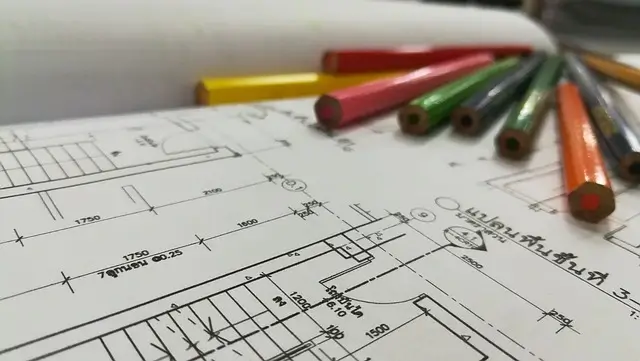The world of civil engineering is vast and diverse, encompassing numerous disciplines and requiring a wide array of skills. Civil engineers are responsible for designing, constructing, and maintaining infrastructure projects such as bridges, highways, tunnels, and buildings.
To effectively carry out these tasks, they rely on various tools to streamline their work and ensure the best possible results. This post will discuss five must-haves for civil engineers, from power tools to essential software applications.
Read on to learn more.
1. Power Tools
Power tools are tools powered by an external source like electricity or compressed air to perform various tasks. In the world of civil engineering, the most popular machines in this category include:
Rotary Hammer Drills
Rotary hammer drills are used for drilling holes in hard materials such as concrete, masonry, and steel. Civil engineers and construction crews often use rotary hammer drills for tasks like installing anchors and drilling holes for reinforcement bars.
Angle Grinders
Angle grinders are versatile power tools that can be used for cutting, grinding, and polishing various materials.
Concrete Vibrators
Concrete vibrators help remove air bubbles and ensure proper compaction of freshly poured concrete. They come in various types, including internal (also known as immersion or poker) vibrators, external vibrators, and surface vibrators. The choice of a concrete vibrator depends on the type of concrete work, the size of the project, and the consistency of the concrete mix.
Circular Saws
Circular saws come in handy when cutting various materials, such as wood, metal, and masonry. With the appropriate blade, a circular saw can make quick and precise cuts, saving time and effort on construction sites.
Impact Wrenches
Impact wrenches, known as torque guns, as well, are powerful tools used for tightening and loosening bolts, nuts, and other fasteners.
Demolition Hammers
Demolition hammers are heavy-duty power tools designed for breaking up materials like concrete, masonry, and asphalt.
The power tool you choose will depend on your project. Of course, hiring a professional civil engineer will ensure that all tools are used as intended.
2. AutoCAD
AutoCAD, developed by Autodesk, is a computer-aided design (CAD) software that has become an industry standard for drafting and designing infrastructure projects. With its intuitive interface and powerful features, AutoCAD allows civil engineers to create detailed 2D and 3D drawings with precision and accuracy. And the software enables engineers to collaborate with other professionals, import and export data in various formats, and make design modifications effortlessly.
AutoCAD offers specialized toolsets for different industries, including architecture, electrical, mechanical, and more. For civil engineers, the AutoCAD Civil 3D toolset is specifically tailored to handle the unique requirements of civil engineering projects, like creating road networks, drainage systems, and land development plans.
3. Geographic Information System (GIS)
GIS is a powerful tool that allows civil engineers to collect, store, analyze, and visualize spatial data related to infrastructure projects. With the help of GIS, engineers can create detailed maps and models of a project site, analyze terrain characteristics, identify potential hazards, and evaluate the environmental impact of their designs. This information is crucial for making informed decisions during the planning, design, and construction phases of a project.
Popular GIS software platforms for civil engineers include ArcGIS by Esri and QGIS, an open-source alternative. Both platforms offer a wide range of features and tools tailored for civil engineering applications, such as network analysis, hydrological modeling, and geotechnical analysis.
4. Project Management Software
Managing large-scale infrastructure projects requires effective organization, communication, and coordination among various stakeholders.
Project management software enables civil engineers to plan, schedule, and monitor the progress of their projects while keeping track of resources, budgets, and deadlines. These tools are essential for ensuring that projects are completed on time, within scope, and up to the required quality standards.
Popular project management software platforms offer comprehensive project management features, such as task assignment, resource allocation, risk management, and performance tracking, tailored for the needs of the civil engineering industry.
Field Data Collection Tools
Civil engineers often need to collect and process field data to inform their designs and monitor construction progress. Field data collection tools, such as surveying equipment, GPS devices, and remote sensing technologies, allow engineers to obtain accurate and reliable information about project sites and their surroundings.
Some popular field data collection tools for civil engineers include total stations, GNSS receivers, and laser scanners. These devices enable engineers to measure distances, angles, elevations, and other relevant parameters with high precision, which is essential for creating accurate site plans and construction layouts.
Conclusion
Civil engineers have a critical role in shaping the built environment, and their work demands the use of advanced tools and technologies.
Power tools, for one, are employed in tasks like cutting, drilling, and concrete compaction. AutoCAD, GIS, project management software, and field data collection tools are essential for efficient civil engineering projects as well. Mastering these tools can help civil engineers stay at the forefront of their profession and deliver innovative solutions.
Read Also:
1. Civil Engineering Drawing – Its Instruments. [A Complete Guide].
2. A Comprehensive Guide on Rate Analysis of Civil Works.
3. Precast Concrete: Its Types, Advantages, Manufacturing
4. Ferrous Metals; Its Types, Uses, Properties [Complete Guide]
5. Non-Ferrous Metals; Types, Uses, Properties [Complete Guide]
